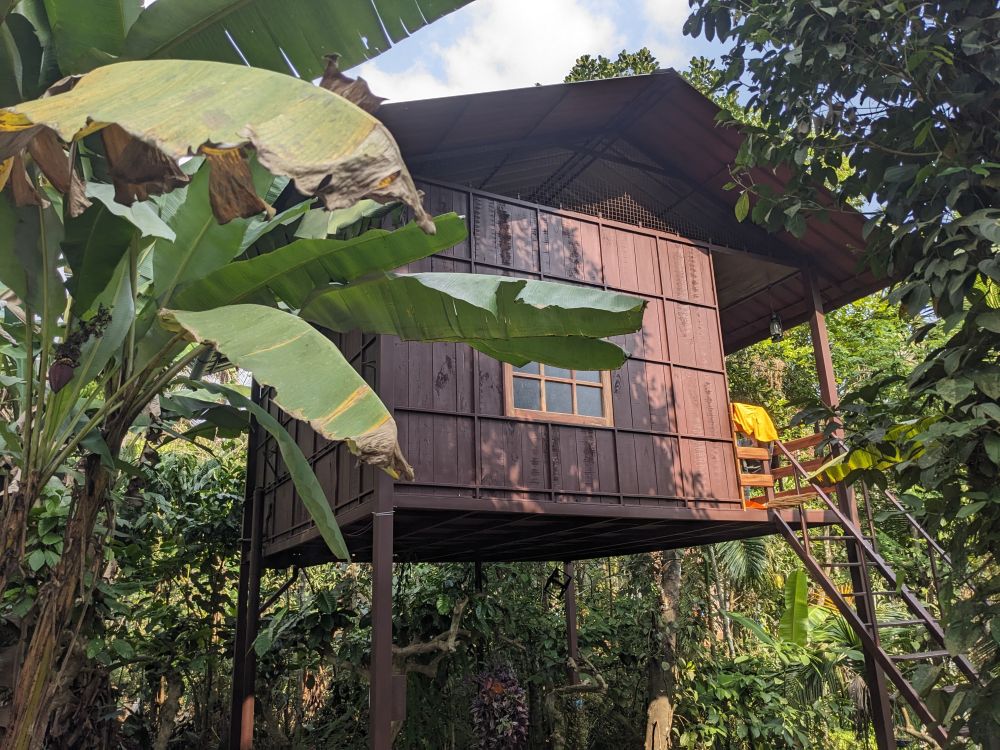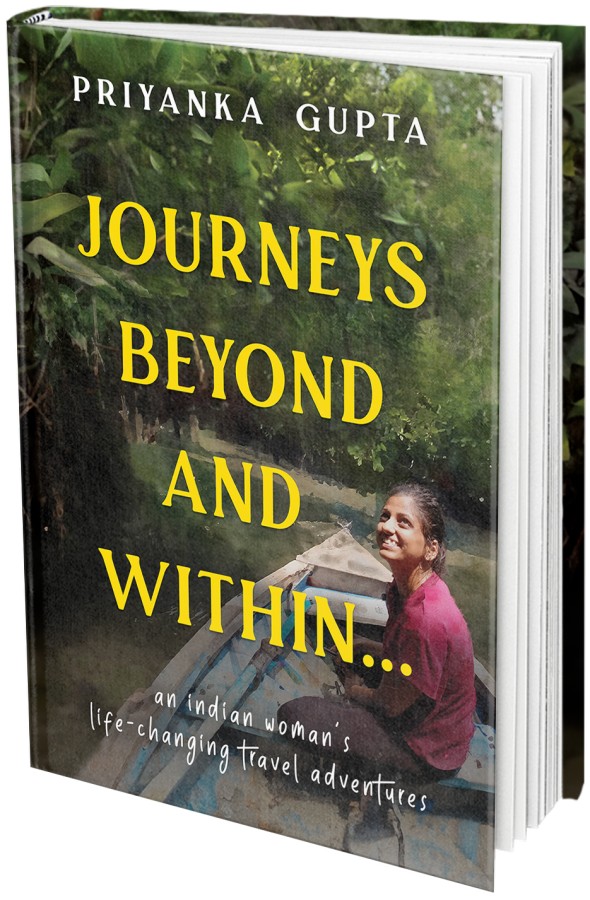Leaving Behind a Forest to Get Into Another One: Finding Accommodation in Wayanad (Kerala)
As I said in the blog post on the Wayanad Wildlife Sanctuary, I wasn’t happy leaving the 100-year-old sylvan cottage that was my home for three days.
The last morning in the Sanctuary’s forest stay was—let’s just say—not easy on me. The previous night, my partner and I finished a bottle of whiskey. In the morning, I showered, and we took a jungle safari. Mommy elephants and baby elephants crossed the road ahead of us. My joy was a little subdued. After the safari, which ended at eight, I packed the rest of the things, brushed, walked, had tea, and wrote for more than an hour.
At eleven, we drove out of our peaceful abode, one that had welcomed us into Kerala. We stopped at a village eating joint where we had lunch the previous day. We had had kadala curry (chana curry), plain dosa, and a vegetarian meal with fish fry. Now, I repeated my order of the coconuty Kadala curry with plain dosa, and my partner had a fish curry with parotta. Of course, in Kerala, they call it parotta, not Kerala parotta, as the world calls the white-flour flaky bread popular from the state.
The same Assamese server who had asked us where we were from and that we looked Hyderabadi took our order. Did we go back to the eatery for the food or him?
We didn’t speak Malayalam or Kannada, and when we spoke Hindi, he asked us in Hindi, “Where’re you from?
“We’re from UP,” my partner said.
And as if that didn’t satisfy him, he asked, “Both of you?” looking at me.
“Yes,” I replied.
He moved to Kerala for work: he cooked and served in that restaurant.
“Assam is nice.” I scooped a lot of chana in a small bite of the dosa.
“You’ve been there?” He asked, with a gleam in his eyes.
“Yes.”
The server’s face brightened but he didn’t ask me where did I go or what did I do. Was he homesick and didn’t want to miss his home state more or he didn’t believe me? I cannot tell. He reminded me of a clothseller from Assam who sold us two saris at a handicraft fair in Pondicherry. He chatted with us in Hindi complaining about the locals bargaining hard.
I think—irrespective of our (intended) open-mindedness towards cultures and unavoidable dependency on locals—we went back to the food place for the Assamese guy. He spoke to us with an immediate intimacy, as if we knew each other, even though his mother tongue must be Assamese or another regional language. Where everyone spoke Tamil, Malayalam, or Kannada—languages different from his mother tongue, Hindi must have bought him some respite.
Today, too, the chana curry was coconuty, the plain dosa was thick and crispy, and the fish curry was tomatoey. Even the chai was nice though it was a bit more sugary than we like it. The total bill was one forty-six, which the shop owner told me in Malayalam. I stared at him, only to make him ask me a question of which I only got one word: Malayalam. He was asking me whether I spoke Malayalam or not.
“No,” I said.
No matter where we go people expect us to speak their language and are surprised to see we don’t.
After lunch, we drove further on, crossing the dusty and hot Sulthan Bethary town. Shops, restaurants, tea stalls, hotels, service centres, grocery stores, and bakeries: all fringed the dusty road. I wouldn’t stay in one of those street-side hotels. Not after the deep silence of the forest.
We continued driving in the direction of the Erakkal caves which are said to have handprints of early humans.
“I’ll stop. I just want to check the tyres.” My partner stopped.
“We should look for a place to stay.”
“I did find two to three good places near the caves.” It was Wednesday. He wanted to stay put, work for the two weekdays, see the caves, and leave.
“You really want to stay near the cave,” I said, indignantly. When you have been together for three years on the road, you understand most things your partner does, even though you may not appreciate them (more on the intricacy of relationships in the linked piece). Sagar was worried about his work days. If it was his holiday, two days near the caves would have been a big waste of time for him.
Among the resorts and homestays near the cave, I liked one guest house. It mentioned a treehouse but the pictures were of a wooden stilt home. Still good, nevertheless. All the reviews were positive. The price was seventeen hundred something for a night.
“I’ve also found two good properties but let’s keep them as backup if this doesn’t work out.” Sagar approved the place.
I called. The man confirmed one of the two tree huts was available. The tariff was twenty-four hundred per night including breakfast and homemade coffee and wine. It was ready to check in.
“But the online price is seventeen hundred?”
“That’s for the smaller hut. That’s not available.”
“How much would it be without breakfast?”
“Twenty-three hundred.”
“It’s a bit expensive for us. We are on a longer trip.”
“So how much? Is 2200 good for you?”
“Actually I was looking for something within 2000. Let me ask my partner and call you back.”
Sagar and I checked out the options he had shortlisted.
“These are both rooms in houses with multiple guest rooms. There wouldn’t be as much privacy as this individual stilt home. Also, this one is near a pond.” I was sold on the greenery around the hut.
“I’ve a feeling this one would work out. Let’s go check it out,” he said.
He spoke from experience and his unending optimism.
First, we stopped for cakes and coffee. No. We stopped for fruits. The big bunches of bananas hanging at the front of the shops called out to us. One store was in fact all bananas: raw banana, ripe banana, small banana, big banana, yellow banana, red banana, banana chips of various kinds. We got watermelon and grapes. Next to the fruit shop was a bakery which offered coffee and juice. We didn’t have coffee there as our homestay promised us coffee.
“There’s coffee at the homestay. Let’s have juice,” I said to Sagar.
“Do you have pomegranate juice?” I asked the guy.
“Do you want it with milk or water?”
“With milk? With water,” I said, quite sure something was wrong with that man. No one had ever offered me pomegranate juice with milk unless I specially ordered a pomegranate shake.
The attendant said, “With water it would be just all water. With milk it’s good.”
After confirming once more “that it’s good with MILK?” I ordered one pomegranate juice. My partner got grape. Seventy for pomegranate. I don’t remember how much for grapes. The bakery had fascinating cakes. Orange and golden sweet halwa squares glistened behind the glass. Generally, halwa is eaten a bit more runny on a plate, but in many places in India, it’s also packed like a cake as it was there. Traditional plum cakes and lots of other baked items all had eggs. I don’t eat eggs. Local Kerala cakes: made of rice flour or white flour and with dates, bananas, and coconut shined in their plastic packaging. Most of them had “shakkar” which probably was jaggery powder. These local sweets were eggless.
A lot of back and forth happened with the shopkeeper. I paced in front of the glass counter filled with sweets. Questions were asked. Details were provided. Stopping myself from buying all, I took one round, puffy rice flour cake. As earthy as jaggery, it looked too good to miss. It would be too good to miss. Just the right sweet, spongy and porous, risen just so well, it would compliment our Kerala coffee in the evening.
The pomegranate shake was the best thing I had ever had. Sweet, juicy, nutritious, well-blended. yum.
The road went beyond the market town up a mountain. Slat-roofed homes fringed the road, each one of them separated by their gardens or estate. I opened the window. The air was cool. We crossed many hotels and food joints.
“I like this area,” I said to Sagar whose complete attention was on manoeuvring the steep ascent around the curves.
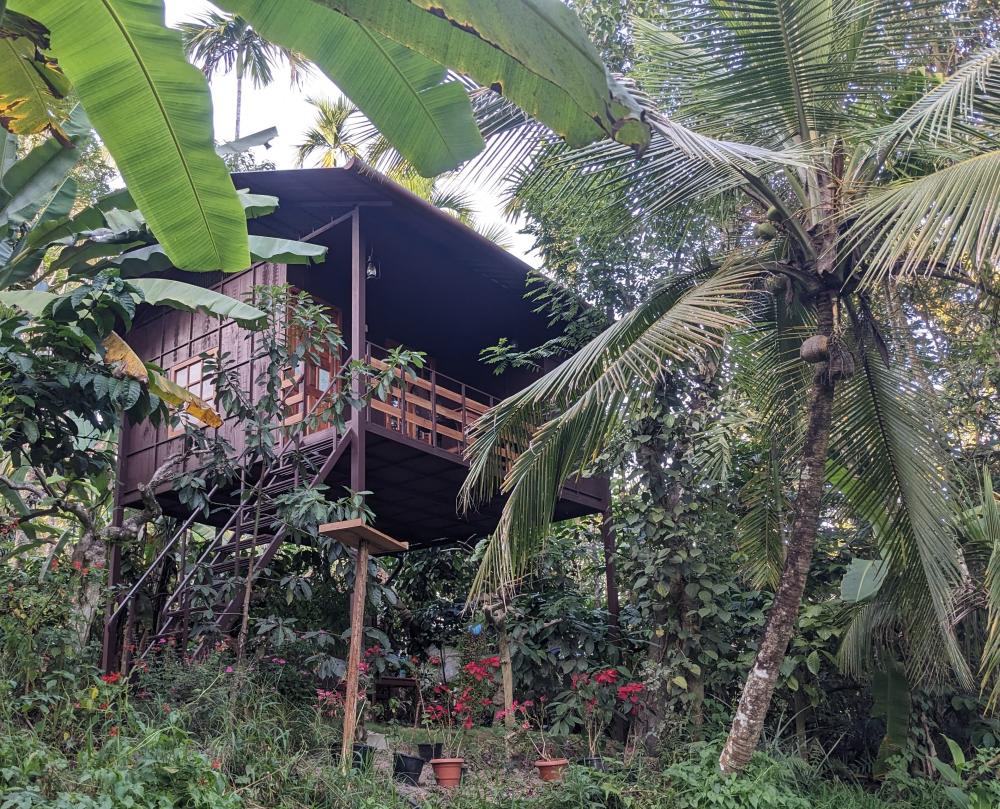
The cabin was better than in the pictures. It was on the backside of the family’s street-facing house. The hut stood in the garden on iron stilts and was made of wood. It overlooked a green algae-covered pond that was itself nestled in a jungle of coconuts, palms, betel nuts, jackfruit, guava, moringa, curry leaf plants, coffee, banana plantains, and mango.
The place was clean. It had a large bed, two wooden work desks, a luggage storage area equipped with hangers, a bathroom with wooden wallpaper on the floor, a tiny geyser, shower, and toilet paper, a wall fan, lamps, three or four doormats placed around the floor, and towels and so on. The wild-fronting balcony with the table and two chairs was perfect to sit, write, read, eat, talk, or look at the green world.
The home was complete.
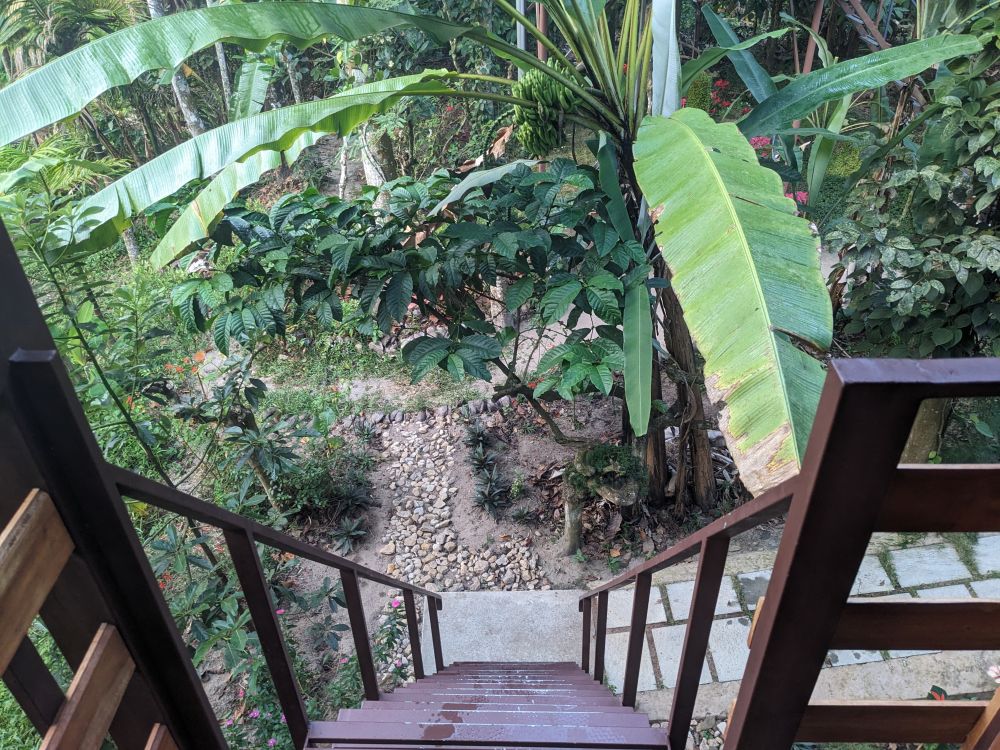
The guy who spoke to me over the phone was the son of the family, not the husband, as I had wrongly assumed. The young, smiling man stood on the stairs while we checked out the place. All my questions about the freshness of the blankets were answered by his mother, whom I would call Aunty, who stood downstairs under the hut and looked up at us, smiling.
“So most homes put up the same blanket after drying them in the sun,” I said, hoping not to sound fussy, only concerned for the right reasons.
“No, no,” she replied. “Everything is washed.”
“We have foreign guests too actually. We give this place on Airbnb so we wash everything,” the boy with curly hair and bright, kind eyes said.
My partner and I exchanged subtle so-we-were-right glances. Finding family-run guest houses and general accommodations in India hasn’t been easy. I had told him that Kerala would be good for us. In our experience, places that host foreigners have higher cleaning standards. Most Indians consider a little filth okay for other Indians.
Alright. We took the place. Parked the car down the steep but manageable slope of the house. Brought up our luggage. All in all, we checked in within ten minutes.
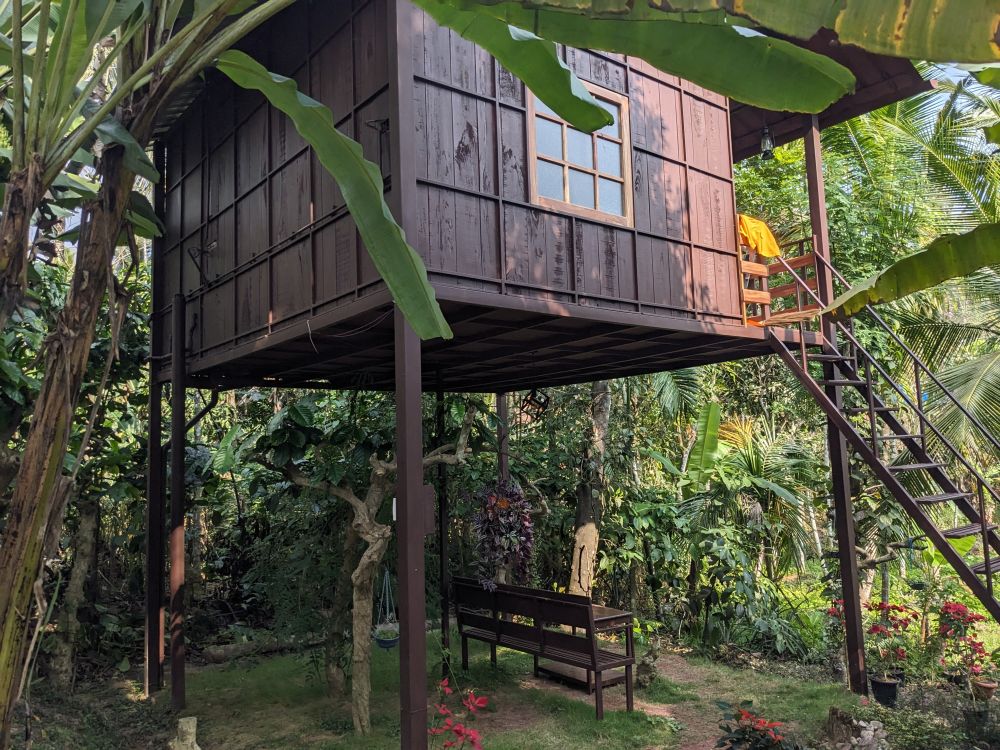
The wooden hut was hot, but I opened a window, and we both slept like babies. We explored downstairs. The dense garden, which was more like a freely growing forest until it petered out into other homes, had not one but two natural ponds. They were green with algae and pink with lilies. Squirrels, mongooses, orioles, bulbuls, and other birds and animals ran into each other and scared each other from getting into their territory. While I was writing downstairs on the sit-out under our hut in the garden, the mongoose inched so close to me I was sure he was trying to tell me, “Miss, you’re here. Fine. But don’t take too much liberty. The place is mine.”
A squirrel jumped onto a wooden platform on which two harmless bulbuls picked cooked rice the family had kept for the animals. The birds flew, and the squirrel stuffed her mouth.
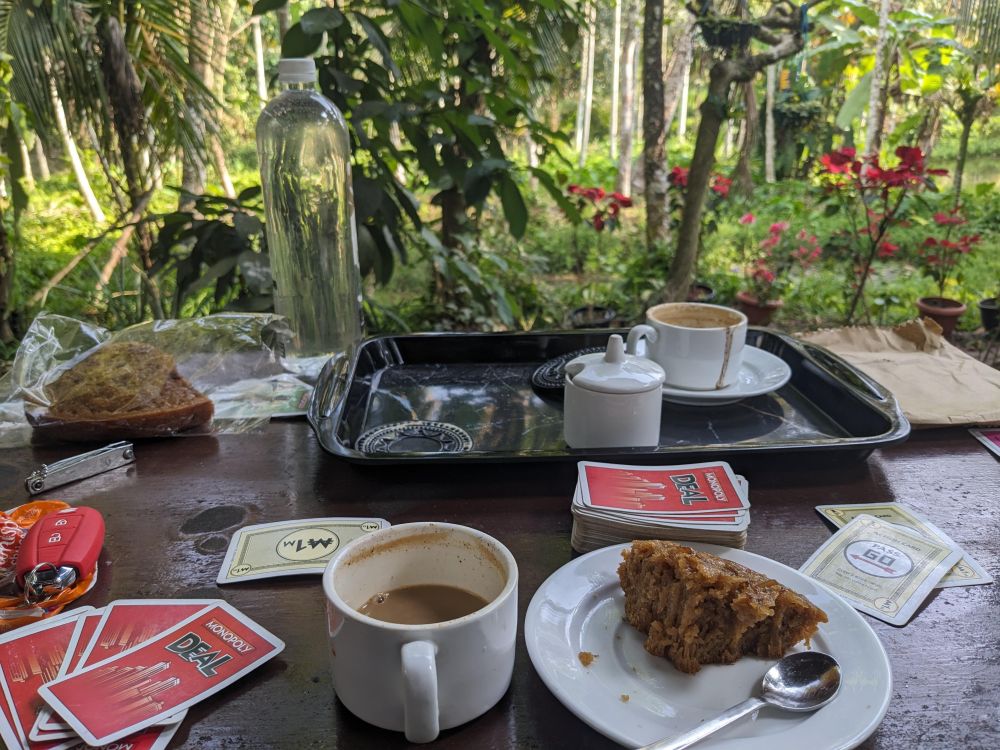
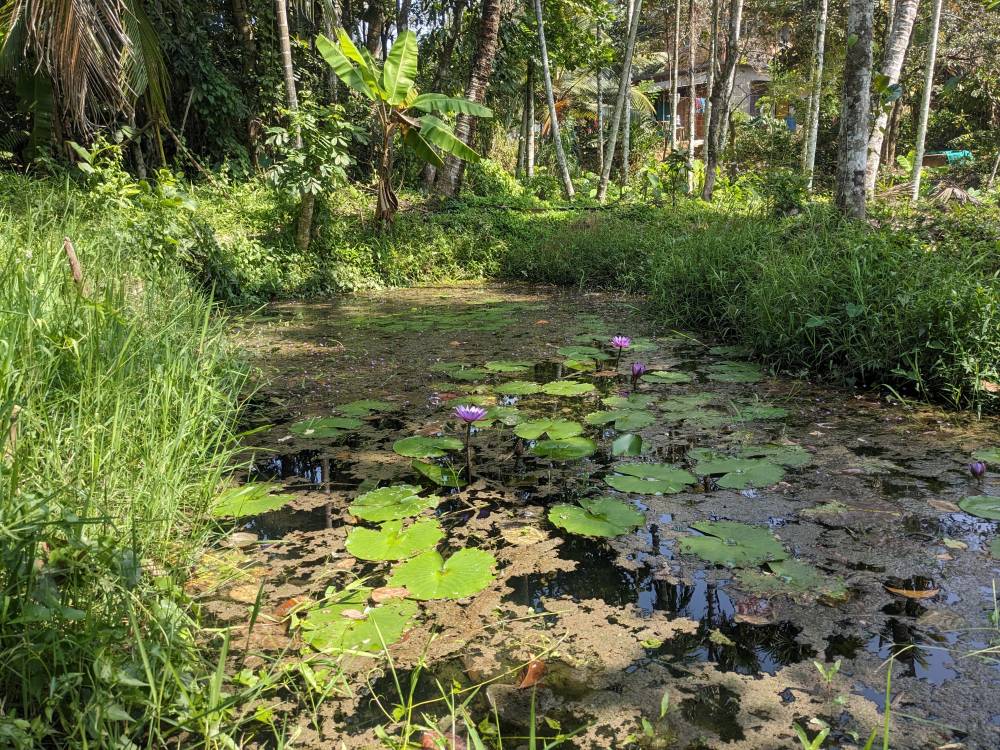
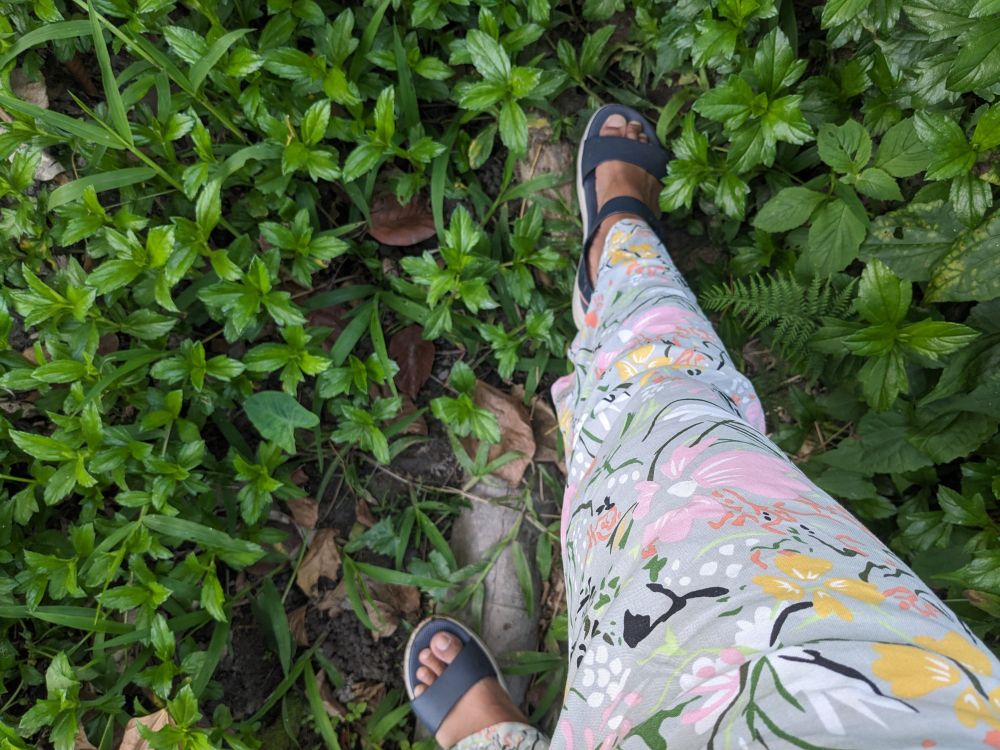
At night, Aunty and the curly-haired boy bought us pineapple and gooseberry wine. I thought they would be mild, but the sweet wines acted on me soon, loosening my limbs. Azaan rose in the air some distance away. Frogs croaked downstairs. Cicadas buzzed. And that was the forest sound I love, all animals alive and kicking.
Sitting on the cool balcony, in complete privacy, with the lamps lit above us, overlooking a little jungle ringing with life, our comfortable room behind us bright with glass lamps and a fairy light around our bed, and every comfort we could ask for promised to us for two nights, along with a nice little family who was ready to help all they could, I was at home, as much as I can be, as much as one can be.
That’s just how things work out on the road.
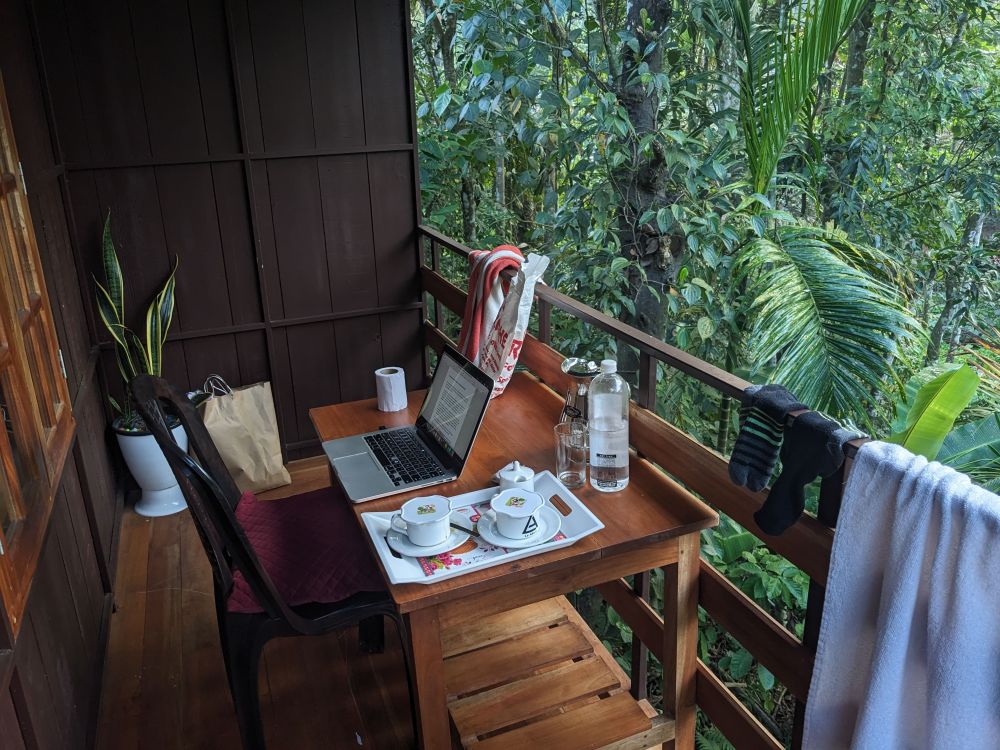
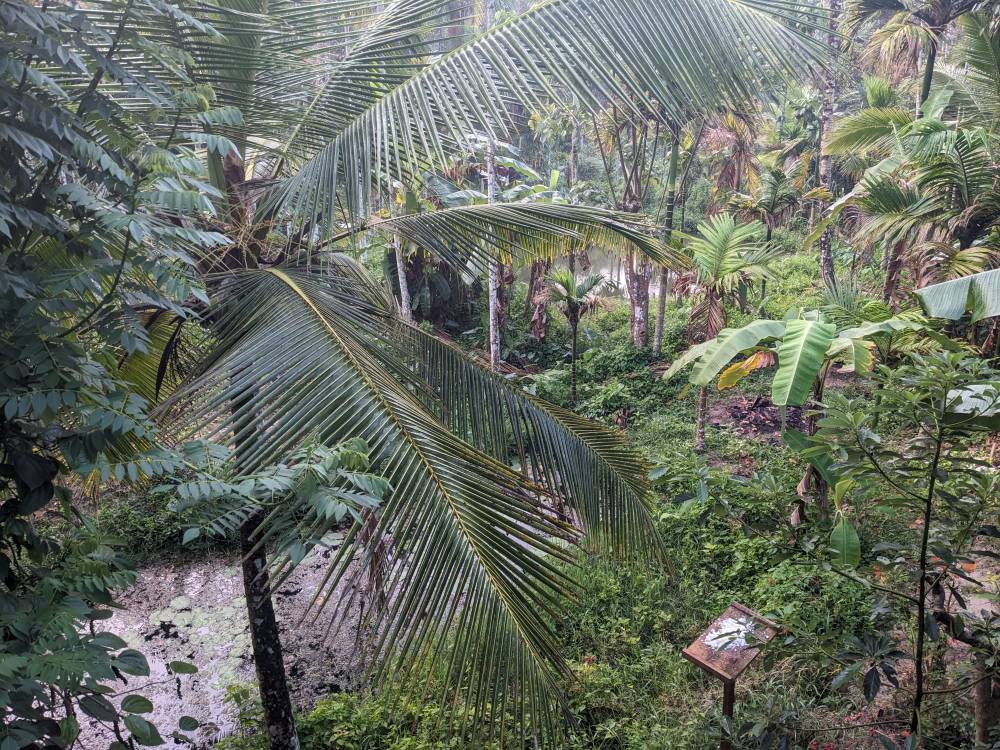
Do you love a green world or a concrete world?
*****
My much-awaited travel memoir
Journeys Beyond and Within…
is here!
In my usual self-deprecating, vivid narrative style (that you love so much, ahem), I have put out my most unusual and challenging adventures. Embarrassingly honest, witty, and introspective, the book will entertain you if not also inspire you to travel, rediscover home, and leap over the boundaries.
Grab your copy now!
Ebook, paperback, and hardcase available on Amazon worldwide. Make some ice tea and get reading 🙂
*****
*****
Want similar inspiration and ideas in your inbox? Subscribe to my free weekly newsletter "Looking Inwards"!

